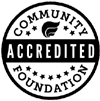Donor-Advised Fund Grants
A donor-advised fund is a philanthropic giving vehicle administered by a charitable sponsor, such as Douglas County Community Foundation (“DCCF”). A charitable sponsor is a 501(c)(3) organization that has legal control over the donor-advised fund and is responsible for operating and maintaining it. Charitable sponsors include public charities, community foundations, and charitable funds that are associated with an investment firm.
Donor-advised funds work like this:
Donors contribute to a fund held by DCCF and receive an immediate tax benefit. Over time, donors recommend grants from the fund to their favorite charities. DCCF awards grants to nonprofits recommended by donors. Note that in addition to cash, donors can also contribute appreciated assets such as stocks, real estate, etc., which can provide substantial tax savings for the donor.
Donor-advised funds are typically invested in mutual funds or other investment vehicles that allow the value of the funds to grow over time, increasing the donor’s ultimate philanthropic impact.
Donor-Advised Funds:
Eight Facts Every Nonprofit Should Know
1. Grants from donor-advised funds should be credited to both DCCF and the donor. When you receive a grant from a donor-advised fund, DCCF is the official donor, so you should record the grant on DCCF’s donor record. The grant should also then be “soft credited” to the specific donor that recommended the grant. Typically, the owner of the donor-advised fund will be identified as the grantmaker, unless the donor has requested that the grant be made anonymously.
2. Thank you’s should come in pairs. The same way you credit both DCCF and the donor, you’ll also want to thank them both, too. Even though the donor is only soft-credited in your records, it’s very important to thank the donor who recommended the grant. Be sure to create a specific acknowledgment letter that recognizes the donor as the one who recommended your nonprofit to receive the grant. Because the donor has already received a charitable tax deduction on these grant funds, please omit your standard tax language on your thank you letter.
3. Donor-advised funds are often the simplest and least expensive way for donors to make a grant of appreciated assets (stocks, real estate, etc.) to your nonprofit. When these types of grants are given from a donor-advised fund, your organization doesn’t need to have a brokerage account, have to manage selling the assets, or provide the necessary paperwork for recognizing the grant. Through a donor-advised fund, your organization will just receive a check for the proceeds. Simple as that!
4. Grants from donor-advised funds can’t be used to fulfill a “pledge.” Even so, you can always ask a donor to commit to recommending a grant for your organization. Instead of “pledge,” DCCF advises donors to reference “donation,” “grant,” or “gift” in his/her grant recommendation.
5. Grants from donor-advised funds can’t be used to purchase tickets to events or provide benefits to a donor. But that doesn’t mean you can’t give a donor event tickets to thank them for having recommended a grant.
6. Donors may have different strategies regarding how they use their donor-advised funds. For example, some use it as a philanthropic savings account, while others use it as an immediate grant conduit and recommend grants soon after they contribute. Some donors use their donor-advised funds to give to many different organizations, and some give to just one charity. Engaging donors in a discussion about how they use their donor-advised funds can help your organization’s outreach better support those efforts.
7. Many donor-advised funds allow the donor to recommend recurring annual grants. This eliminates the need for the donor to initiate the grant each year. Asking a donor to make a recurring grant will significantly increase the likelihood of the donor’s continued support.
8. Donors who give through a donor-advised fund are some of your best major gift candidates. By setting up and funding a donor-advised fund, a donor demonstrates a great commitment to philanthropy and a demonstration of capacity.
View a list of established donor-advised funds here.
 |
For more information, contact Lori Trenholm, Director of Community Investment |


